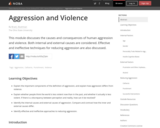
Text and links to all ancillary materials for Module 54
- Subject:
- Psychology
- Social and Behavioral Sciences
- Material Type:
- Module
- Reading
- Teaching/Learning Strategy
- Author:
- Brad J
- Date Added:
- 05/31/2021

Text and links to all ancillary materials for Module 54

By Brad J. Bushman, The Ohio State University. This module discusses the causes and consequences of human aggression and violence. Both internal and external causes are considered. Effective and ineffective techniques for reducing aggression are also discussed.
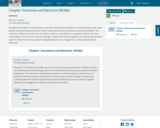
By Randy J. Nelson, The Ohio State University.The goal of this module is to introduce you to the topic of hormones and behavior. This field of study is also called behavioral endocrinology, which is the scientific study of the interaction between hormones and behavior. This interaction is bidirectional: hormones can influence behavior, and behavior can sometimes influence hormone concentrations. Hormones are chemical messengers released from endocrine glands that travel through the blood system to influence the nervous system to regulate behaviors such as aggression, mating, and parenting of individuals.
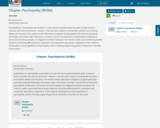
By Chris Patrick, Florida State University. Psychopathy (or “psychopathic personality”) is a topic that has long fascinated the public at large as well as scientists and clinical practitioners. However, it has also been subject to considerable confusion and scholarly debate over the years. This module reviews alternative conceptions of psychopathy that have been proposed historically, and reviews major instruments currently in use for the assessment of psychopathic tendencies in clinical and nonclinical samples. An integrative theoretic framework, the Triarchic model, is presented that provides a basis for reconciling differing historic conceptions and assessment approaches. Implications of the model for thinking about causal hypotheses of psychopathy, and for resolving longstanding points of contention in the field, are discussed.

Psychology is designed to meet scope and sequence requirements for the single-semester introduction to psychology course. The book offers a comprehensive treatment of core concepts, grounded in both classic studies and current and emerging research. The text also includes coverage of the DSM-5 in examinations of psychological disorders. Psychology incorporates discussions that reflect the diversity within the discipline, as well as the diversity of cultures and communities across the globe.Senior Contributing AuthorsRose M. Spielman, Formerly of Quinnipiac UniversityContributing AuthorsKathryn Dumper, Bainbridge State CollegeWilliam Jenkins, Mercer UniversityArlene Lacombe, Saint Joseph's UniversityMarilyn Lovett, Livingstone CollegeMarion Perlmutter, University of Michigan


By the end of this section, you will be able to:Define aggressionDefine cyberbullyingDescribe the bystander effect

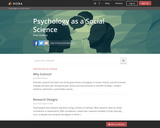
Provides standard introduction to psychology course content with a specific emphasis on social aspects of psychology. This includes expanded content related to social cognition, aggression, attraction and similar topics.
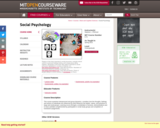
This course examines interpersonal and group dynamics, considers how the thoughts, feelings, and actions of individuals are influenced by (and influence) the beliefs, values, and practices of large and small groups. Learning occurs through a combination of lectures, demonstrations and in-class activities complemented by participation in small study groups and completion of homework assignments.

A brief introduction to the psychological experience of aggression. Duration: 2:37
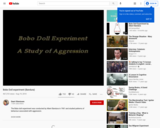
During the early 1960s a great debate began regarding the ways in which genetics, environmental factors, and social learning shaped a child’s development. This debate still lingers and is commonly referred to as the Nature vs. Nurture Debate. Albert Bandura conducted the Bobo Doll Experiment to prove that human behavior is largely based upon social imitation rather than inherited genetic factors.
Duration: 4:08.